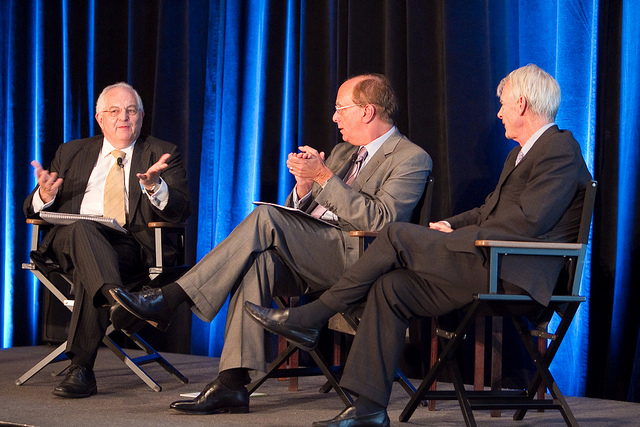
Larry Fink is Chairman and CEO of Blackrock, the world’s largest investment management company with over $5.4 trillion in assets including iShares ETF products. He spoke late last month at Morningstar’s Investment Conference and discussed a wide range of issues including the state of the US economy, the state of active and passive investing, and how the industry is evolving in light of rapid technology change. I thought a recap of his comments would be of interest.
US Economic Growth Slowest of G7 in Q1
Larry commented on the latest GDP figures from Q1. The US economic grew just .7% in Q1. Larry commented that this is the slowest of all of the top seven developed countries (known as the ‘G7’). His personal view is that US is taking a pause to ‘wait and see’ how the new administration’s policies unfold. He noted that outside countries seem to view the US as a ‘less welcoming’ place and cited weakness in hotel stays and foreign student enrollment in US colleges. He commented that consumer sentiment is strong, but this is not transferring to the c-suite (corporate suite / CEO level). His outlook was for 2-2.5% growth. He doesn’t see the US hitting the 3% real GDP growth being targeted by the administration. “It is improbable given the US demographics”, said Fink.
Regarding the new administration’s policies, he said that they are largely in line with ‘the bucket list’ of items Blackrock would like to see. Lower taxes should spur investment. He did sound a note of caution regarding US deficits. He commented that we have the highest debt to GDP of the G7 and 35% of this is ‘financed by the rest of the world’. He said that debt and the deficit are not playing a central role in the tax reform debate.
On a more detailed note, he commented that a tax holiday on repatriation of foreign cash would likely get used for stock repurchases and possibly M&A. Companies have had ample access to debt financing at low interest rates so he doesn’t think the repatriation will go into investment. He did say he would like to see the government earmark the taxes from the repatriation specifically for infrastructure spending.
Active vs. Passive Investing
Blackrock is one of the largest providers of passive index funds. Passive index funds have seen large inflows in recent years. Blackrock also has a wide range of Smart Beta (factor based investment strategies) and active management funds. In Q1, they recognized their business and increased focus on bringing the quantitative portfolio managers together with the pure active fund managers. He indicated that the factor and quant fund managers had been doing quite well with consistent returns. He is not giving up on active investing and sees a roll for active fund managers going forward. In fact, he said he thought the outlook for active investing is improving. He specifically noted that he wants to get an integrated view of investment strategy and more closely align the stock pickers who focus on fundamentals in synch with the quant / factor based research teams.
He talked about a shift in how managers are employing active management. He sees ETFs based on sectors being used to implement macro based active management. In this type of active management, fund managers are not looking for alpha on a company by company basis. Instead, they look to participate in major themes by targeting specific industries. He said he felt that new factors will continue to emerge and he thought that their ETFs would be useful for this.
How the Wealth Advisor Business is Changing
He notes interesting macro trends as a context. People are living longer. Defined benefit plans have continued to disappear. Investors in the US have poor financial literacy. As a result, he feels that the defined contribution plans (IRA, 401k) have been a ‘disaster’ for the US. As a result, he said he felt that the need for good financial advice was as important as ever.
He commented specifically on millennials. He said they do not want to talk with people or take investment advice. They would rather use electronic devices and educate themselves. He said that advisors should consider how they will interact with millennials and how they may need tools to meet the needs of this group.
Technology Impact on Investing
Larry spoke at length about technology. He noted that Blackrock has 13,000 employees and that number has been roughly flat for three years. At the same time, the investments under management have grown considerably. Fink said they are spending large amounts on technology, including artificial intelligence (AI). This helps keep cost down for investors. They have recently cut the expense ratios on their core asset class ETFs to the lowest in the industry, said Fink.
He talked about how quantitative investing and AI opportunities. We have so much data and so much computing power. He gave a simple example. From Blackrock research they know that companies with happy employees do better. He said, using social media data from employee comments they can collect, analyze and determine which companies’ have happy employees and use that information in investment decisions.
Although he is very interested and investing large sums in research on AI, he said he was still ‘skeptical’. He said there are ‘millions of pieces of data’ and at the same time we have human biases that impact our decisions. Whatever the outcome, he thought they would gain valuable insights from the activity.